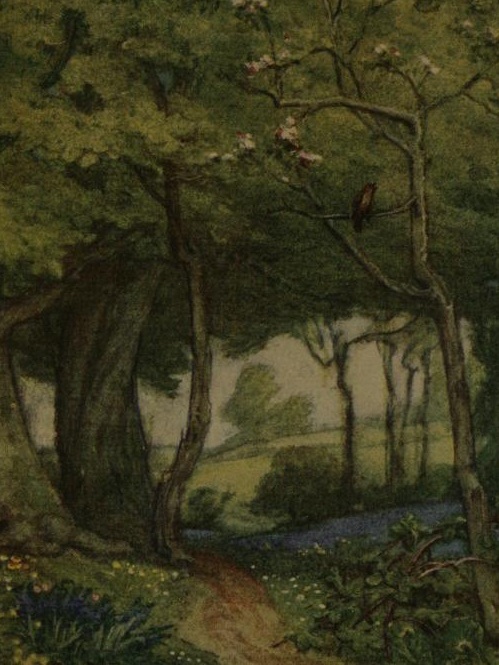John Keats, selected poems Contents
- Social and political context
- Religious and philosophical context
- Literary context
- Bright Star! Would I were steadfast as thou
- The Eve of St Agnes
- ‘Hush, hush! tread softly! hush, hush, my dear!’
- Isabella: or The Pot of Basil
- La Belle Dame Sans Merci
- Lamia
- Lines to Fanny (‘What can I do to drive away’)
- O Solitude, if I must with thee dwell
- Ode on a Grecian Urn
- Ode on Indolence
- Ode to a Nightingale
- Ode to Autumn
- Ode to Melancholy
- Ode to Psyche
- On First Looking Into Chapman’s Homer
- On Seeing the Elgin Marbles
- On the Sea
- Sleep and Poetry
- Time’s sea hath been five years at its slow ebb
- To Ailsa Rock
- To Leigh Hunt
- To Mrs Reynolds’s Cat
- To My Brothers
- To Sleep
- When I have fears that I may cease to be
Nature
The natural ideal
 Keats wrote about nature as a source of beauty and as a refuge from the stresses and strains of life in the city. As a poet who celebrated the five senses, Keats loved nature for its sensuous appeal: flowers, for instance, for their colour, scent and softness; streams for their coolness and for the calming sounds of flowing water.
Keats wrote about nature as a source of beauty and as a refuge from the stresses and strains of life in the city. As a poet who celebrated the five senses, Keats loved nature for its sensuous appeal: flowers, for instance, for their colour, scent and softness; streams for their coolness and for the calming sounds of flowing water.
He describes the natural world with great precision. Over a hundred plant species have been identified in his work, including his odes To a Nightingale and To Psyche. For Keats the world of nature is the closest we can come to an ideal world, a sort of Eden, and is the only real environment that can approach the ideal forms created by the human imagination.
Nature and classical myth
Keats often personifies natural phenomena, sometimes using classical myth to animate the objects and forces of nature. Greek divinities (Apollo, Flora etc.) and spirits (Naiads, Dryads etc.) frequently populate Keats’ depictions of the natural world and, as in the case of ancient mythology, give a distinctly human character to natural phenomena.
The Odes
In the Ode to Autumn Keats reflects on the cycle of life and the interconnectedness of maturity, death and rebirth as one season gives way to another. The poem is full of the feeling of nature’s generosity. The combination of labour, delight and natural wealth offers the impression of a humanity happy and at peace with the world in which it lives. Humankind is not the dominant force in the scenes depicted. The imagery stresses the astonishing variety of nature: the profusion of crops, the flowers, the clouds, the lambs, the whistling robin, even the cloud of gnats. Nature provides a feast for all the senses: the taste of the fruit and honey, the sounds of animals and insects, the effects of autumnal weather.
In Ode to a Nightingale, hearing the bird’s song causes the speaker to reflect on the immortality of art and the mortality of humans. The speaker of Ode on Melancholy compares a bout of depression to a ‘weeping cloud’, then goes on to list specific flowers that are linked to sadness. He finds in nature apt images for his psychological state.
In Ode to Psyche the speaker scans the night sky to find ways to worship the Roman goddess Psyche as a muse: a star becomes an ‘amorous glow-worm’ and Keats captures the beauty of the moon resting against a background of dark blue.
On the Sea
In On the Sea Keats is fascinated by the vastness of the ocean - something which appears eternal, contrasting this with the ephemeral affairs of humankind. The sounds of the sea are vividly suggested by all the sibilants in the first two lines (seven ‘s’ sounds altogether). These sounds have been occurring apparently forever and will continue to do so. The sea is linked with ancient mysteries, the goddess Hecate being invoked in line 4.
The changing mood-swings of the sea are captured by dwelling on the contrast between its vast expanse and the ‘very smallest shell’ which the sea can leave in place for days, if in the mood to do so.
O Solitude! If I must with thee Dwell
In O Solitude! If I must with thee Dwell the speaker expresses his desire in the first part of the poem (octet) that if he must live in solitude, then he would rather be alone in nature than in the squalid ugliness of a city.
The contrast between city and countryside is a familiar idea in poetry – especially Romantic poetry. A knowledge of Keats’ personal circumstances - a sensitive young man living in the rough, insalubrious district of Southwark, seeing daily disease and suffering in Guy’s Hospital – make this address to solitude, the desire for escape to the countryside and the yearning for a kindred spirit with whom he could share his life – all the more understandable.
To Ailsa Rock
Similar feelings about the power and mystery of nature are contained in To Ailsa Rock, a poem which records a walk through rain with the great rock of the title lowering in the distance and seeming to follow Keats and his companion like some primeval companion. Keats told his brother Tom that he was ‘a little alarmed’ so, to exorcise the rock’s haunting spirit, Keats wrote this sonnet to express something of the horror he felt. He was in the deeply mysterious presence of this gigantic natural object which was undoubtedly ‘dead’ but which seemed in some ways alive and open to question.